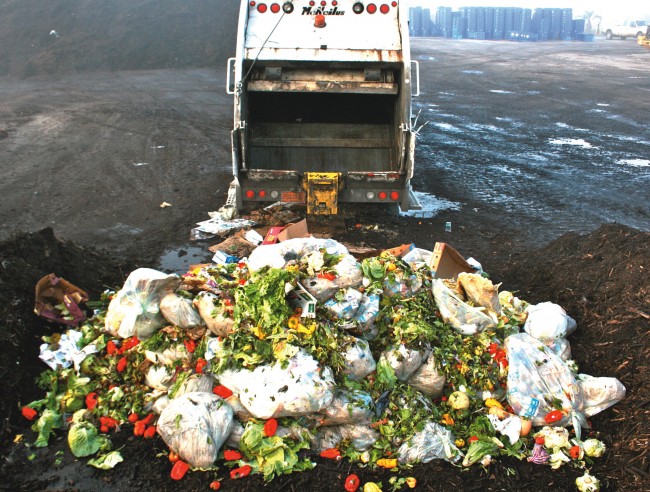After a year-long pilot, the South Carolina county received a permit to process food waste at its yard trimmings composting facility. Generators and haulers are stepping up to the plate.
Molly Farrell Tucker
BioCycle January 2013, Vol. 54, No. 1, p. 47
A two-season waste composition study conducted in 2009-2010 found that food waste accounted for more than 19 percent of the total municipal solid waste (MSW) generated in Charleston County, South Carolina. On September 1, 2010, the South Carolina Department of Health and Environmental Control approved the Charleston County Environmental Management Department’s request to implement a 12-month food waste composting pilot, the first such project in the state. The county successfully completed the pilot program and received an operating permit effective June 6, 2012, to process food waste at its Bee’s Ferry Compost Facility in Charleston.
The county’s role is to process incoming food waste and ensure the quality of the finished compost product. A Commercial Food Waste Recovery Program was implemented to provide information to businesses on what can be composted and who to call for collection services and fees. “This program provides a new opportunity for businesses that are looking to divert their organic waste from our landfill,” says Carolyn Carusos, Charleston County’s Recycling Program Manager. “Participating businesses benefit by reducing their annual disposal costs and achieving a higher recycling rate and/or a zero waste goal.”

Food Waste Disposal began its dedicated organics collection service in March 2012. Customers are provided 64-gallon totes, and food waste is hauled to the Bee’s Ferry Compost Facility.
Charleston County currently partners with local haulers who deliver commercial food waste to the Bee’s Ferry facility. Publix Super Markets is the first grocery store chain in the county to have its produce and floral waste composted. The contract came about after Publix was approached in June 2012 by the county’s Environmental Management Department. “Publix has created a win-win situation by supporting Charleston County’s 40 percent recycling goal and expanding its recycling program for their local stores,” notes Carusos.
Food Waste Hauler
Kim Brunson, Publix’s Recycle and Solid Waste Program Manager, was provided the list of haulers and contacted Wayne Koeckeritz, who had recently started Food Waste Disposal to haul commercial compostables. Koeckeritz had worked for the previous 14 years as a facility manager in luxury hotels where he oversaw solid waste disposal and recycling programs. “I saw the tremendous amount of food waste that was generated by those operations,” he notes. “However, there weren’t any viable options to deal with this waste until Charleston County started a food waste composting pilot program. So, with my background in operations, a passion for sustainability and the opportunity to start a business hauling food and organic waste, I decided it was time.” Koeckeritz launched his operation in March 2012.
Food Waste Disposal began servicing five Publix stores in the Charleston area in mid-December. “All Publix associates want to participate in programs that help the environment,” she explains. “This gives them that chance.” Brunson trained the associates in the five Publix stores in Charleston County. The company developed a training program for separating organics, as some of its stores in Florida participate in diversion programs. Overall, the chain has 1,069 stores in Florida, Georgia, South Carolina, Alabama and Tennessee.
By late January 2013, Food Waste Disposal will have 45 clients including the College of Charleston and the Medical University of South Carolina as well as restaurants, public schools, hotels, a manufacturing facility and hospitals. With the exception of the Publix stores and schools with their own training programs, Koeckeritz trains all of his customers’ employees on source separating organics. “Education is the most important piece to having a successful food waste collection program,” he says. “I find that one or two 15-minute sessions working with the staff are extremely beneficial. These training sessions provide an opportunity to ask questions and see that source separation is not nearly as difficult as they originally perceived it would be.”
Generators serviced by Food Waste Disposal receive 64-gallon wheeled carts. For most customers, including Publix, Koeckeritz lines the carts with an EcoSafe compostable liner that he changes at every service. Other customers purchase smaller sizes of compostable liners for their operations and place them in the carts. Food Waste Disposal is currently using a 25-cubic-yard McNeilus rear loader with a cart tipper to collect the organics. “I am looking at adding an additional vehicle, most likely with a custom food waste body,” he notes. At this time, he works solo, but expects to hire his first employee during the first quarter of 2013.
Koeckeritz adds there have been some challenges starting the business in Charleston County. “The idea of composting food and organic waste on a commercial scale is new to many businesses here,” he says. “Early adopters were the first to come on board, but it has taken some time to get more mainstream companies to see the economic and environmental benefits of composting. The geography of Charleston County, with its various waterways, makes the logistics of route planning a bit more difficult than a traditional metropolitan area. Creating route density along those routes has been an important part of making the business profitable. And, as a nontraditional start-up waste hauler, I needed to demonstrate reliability and a commitment to service for my clients.”
Molly Farrell Tucker is a Contributing Editor to BioCycle.










